Index relies entirely on the support of donors and readers to do its work.
Help us keep amplifying censored voices today.
A Syrian-native who was studying journalism in London when war broke out in Syria in 2013, Zaina Erhaim decided to return permanently to report and train citizen journalists in the war-ravaged country. Between the violence and deadly misogyny of IS and the bombing raids of Russian allies of Assad the danger of living in the region as a female reporter is immense. However, Erhaim has trained hundreds of journalists, including many women.
In this photo essay, Erhaim explains her work and her life in Syria.
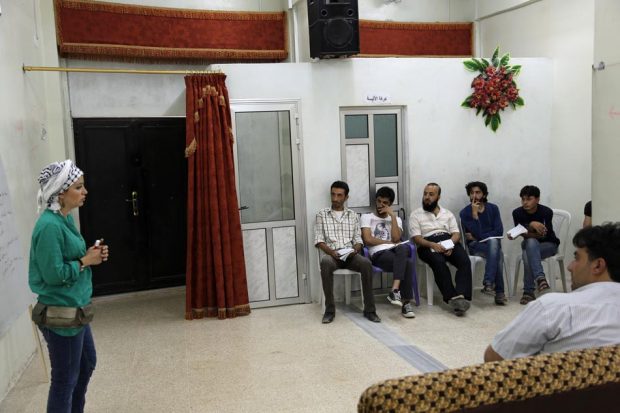
After the revolution in 2011, many Syrians became citizen journalists to report the regime’s crackdown on the demonstrations. Without any background in journalism or reporting, hundreds of activists became the main source of news and information for the rest of the world. I felt a responsibility to pass the knowledge and skills I had in journalism to them, and this is the first training I did in the suburbs of Edlib. Two of the trainees passed these skills to 40 other activists, some of whom are now publishing features and reports for the Syrian media.
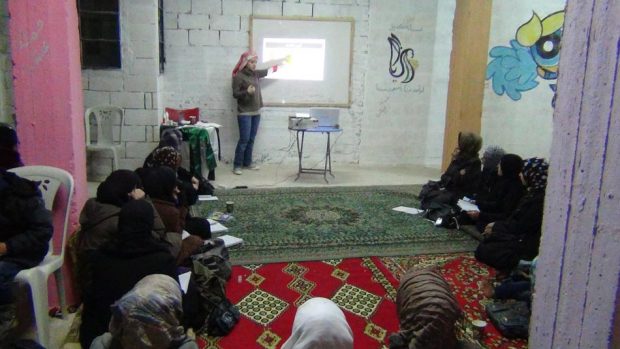
There were only a couple of female citizen journalists living in the rebel-held areas in the northern Syria, so I decided to offer the training to those interested in learning (unlike the men who, who were mostly already citizen journalists). I was surprised how many women were actually interested. Some are now making a living from writing for our website Damascus Bureau and other websites, which turned their conservative, closed-minded husbands from opposing to supporting their work.
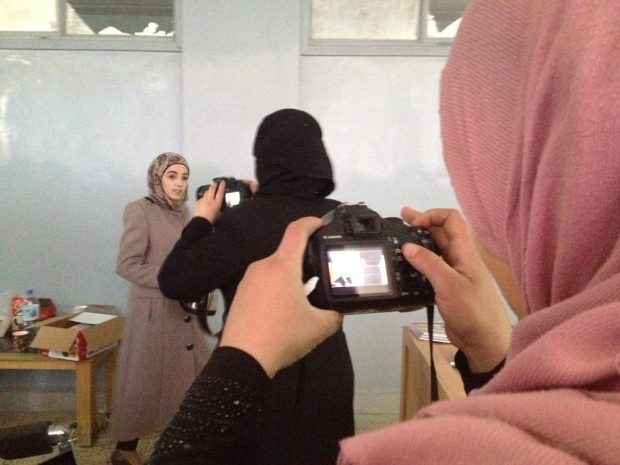
Writing was the easier choice for the women interested in being citizen journalists as it could be done anonymously with no need to grab attention holding a camera in the street, but some wanted to learn.
The woman in this picture – a schoolteacher – told me: “I want to report myself for the school instead of asking for a male citizen journalist to come whenever we have an activity, and I know the women teachers would speak to me much more comfortably in an interview.”
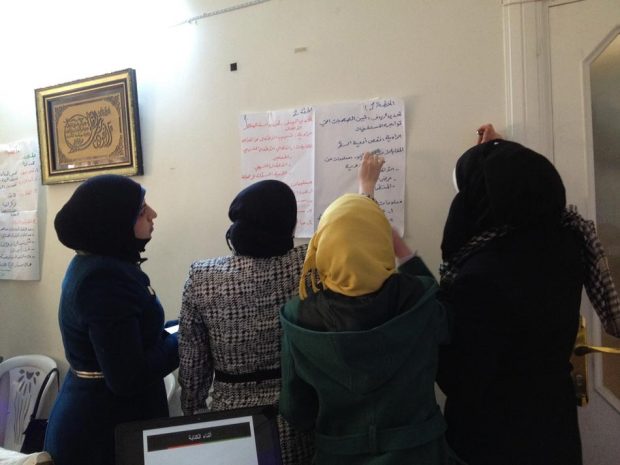
Besides journalism, through the Institute for War and Peace Reporting, we’ve established women-only internet cafes where women can come and learn how to use social media, surf the internet and use the computer. All means of communication have been cut by the regime for years, and the satellite internet cafes existed are male dominated. This means women are disconnected, so providing these centres is like giving them a window into the world.
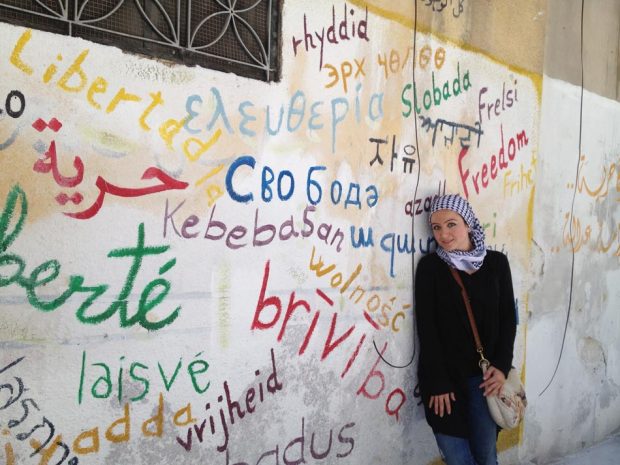
Some might consider me biased because I stand with the freedom revolution in my home. On my blog, my slogan is: “I am biased to humanity and I am proud to be so.” I don’t think any journalist can be impartial when reporting about IS or Kim Jong-un’s crimes, so why with Assad? I was interrogated by his military security forces in 2008 because of an article I wrote and because I was active in a civil society organisation. I am forbidden from going home to Damascus, because I am a journalist and not a propagandist.

To document the human side of our war I started filming people, streets, life behind the frontline, death and horror. I chose to document the heroines who are facing extra difficulties because they are women, so I made five short films and named them Syria’s Rebellious Women.
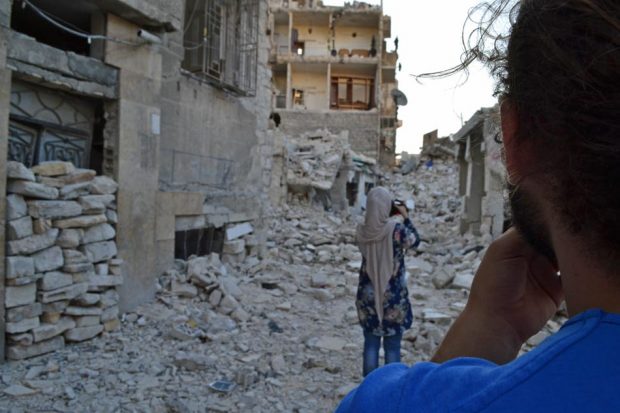
“You pass the Kalaase massacre mark then turn right you will find me waiting for you there… .” Somehow destroyed buildings and massacres become part of the daily view and even marks to guide people to places. At this particular spot, I got engaged. Someone wrote “Heaven” on the wreckage with an arrow directed to the sky. There we exchanged our vows to keep loving life and to not forget the sacrifices of those who have gone in order for us to live free in a democratic country.
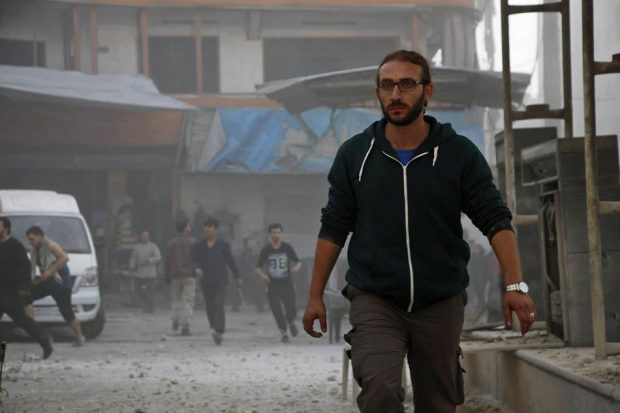
This is my husband Mahmoud, doing what he does every day: running toward bombed areas to rescue victims and provide first aid to those who need it. He has been injured many, most recently two weeks ago in a Russian air attack in Kallaseh grocery market. Three bits of shrapnel are still in his leg. Despite being a pioneer activist, a giving person who is ready to give his life for to protect and help people he doesn’t even know, and in spite of his work for international organisations, his visa to the UK has been rejected fearing that he “won’t leave the UK”.
Related:
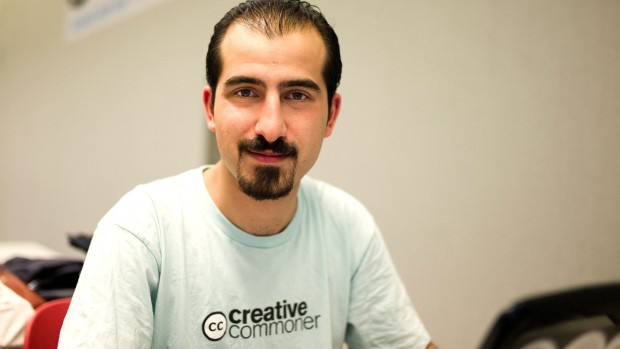
Syria’s authorities should reveal the whereabouts of Bassel Khartabil, a software developer and free speech activist, and release him immediately, 31 organisations said on the fourth anniversary of his detention.
On 15 March 2012, Military Intelligence arrested Khartabil and held him in incommunicado detention for eight months before moving him to ‘Adra prison in Damascus in December 2012. During this time, he was subjected to torture and ill-treatment. He remained in ‘Adra until 03 October 2015, when he managed to inform his family that he was being transferred to an undisclosed location. Since then his whereabouts remain unknown and there are serious concerns for his life.
Based on unconfirmed information that the family received from some local sources, there are fears that he may have been tried and sentenced to death by a Military Field Court in the Military Police headquarters in Al-Qaboun, Damascus. These courts are notorious for conducting closed-door proceedings that do not meet minimum international standards for a fair trial.
Since his detention, many human rights groups have campaigned for his release. On 21 April 2015, the United Nations Working Group on Arbitrary Detention declared his detention a violation of the International Covenant on Civil and Political Rights, and called for his release, yet the Syrian authorities refuse to free him.
A Syrian of Palestinian parents, Khartabil is a 34-year-old computer engineer who worked to build a career in software and web development. Before his arrest, Khartabil used his technical expertise to help advance freedom of speech and access to information via the internet. He has won many awards, including the 2013 Index on Censorship Digital Freedom Award for using technology to promote an open and free internet, and was named one of Foreign Policy magazine’s Top 100 Global Thinkers of 2012 “for insisting, against all odds, on a peaceful Syrian revolution”.
The signatory organisations express concern at his ongoing arbitrary detention and enforced disappearance and believe that it is a direct result of his peaceful and legitimate work for the promotion and protection of the right to freedom of expression.
The groups call on the authorities in Syria to:
Co-signed:
1. Arabic Network for Human Rights Information (ANHRI)
2. Association for Progressive Communications (APC)
3. Amnesty International
4. CIVICUS: World Alliance for Citizen Participation
5. Electronic Frontier Foundation (EFF)
6. English PEN
7. Euromed Rights (EMRHN)
8. Front Line Defenders (FLD)
9. Gulf Center for Human Rights (GCHR)
10. Human Rights Watch (HRW)
11. Humanist Institute for Cooperation with Developing Countries (HIVOS)
12. Iraqi Network for Social Media (INSM)
13. International Civil Society Action Network (ICAN)
14. International Federation for Human Rights (FIDH), within the Observatory for the Protection of Human Rights Defenders
15. International Media Support (IMS)
16. International Service for Human Rights (ISHR)
17. Iraqi Association for the Defence of Journalists’ Rights (IJRDA)
18. International Media Support (IMS)
19. Index on Censorship
20. Jordan Open Source Association (JOSA)
21. Lawyers Rights Watch Canada
22. Metro Centre to Defend Journalists in Iraqi Kurdistan
23. No Peace Without Justice (NPWJ)
24. PAX for Peace
25. PEN International
26. Reporters Without Borders (RSF)
27. Samir Kassir Foundation
28. Sisters Arab Forum for Human Rights (SAF)
29. Syrian Center for Media and Freedom of Expression
30. The Day After
31. Tunisian Initiative for Freedom of Expression
32. World Organisation Against Torture (OMCT), within the Observatory for the Protection of Human Rights Defenders
33. Violations Documentation Center in Syria (VDC)
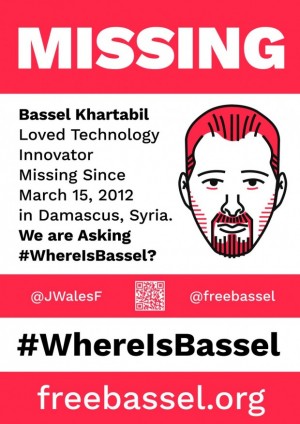
Join the Jimmy Wales Foundation and other organisations, including Index on Censorship, in a day of solidarity, awareness and support for Palestinian-Syrian open access activist Bassel Khartabil.
Khartabil was detained on 15 March 2012, the first anniversary of the Syrian uprising, as he left work in the al-Mezzeh district of the city. He has been in prison for four years, although his exact location is currently unknown.
Khartabil started Syria’s first hackerspace in 2010 to help advance the open source movement in the country. He is also known for his work with on free culture projects such as Creative Commons, Wikipedia and Mozilla Firefox.
On 12 November 2015, Khartabil’s wife, Noura Ghazi Safadi, reported rumours that her husband had been sentenced to death by the military courts, although the Assad regime has yet to confirm or deny the reports.
On Saturday 19 March people around the world will take to the streets, including at a demonstration at Marble Arch in London, to #FreeBassel. Find the Bassel cutout and take selfies with him and upload it with #WhereIsBassel on social media.
When: 19 March, 2pm
Where: Marble Arch, London (Map)
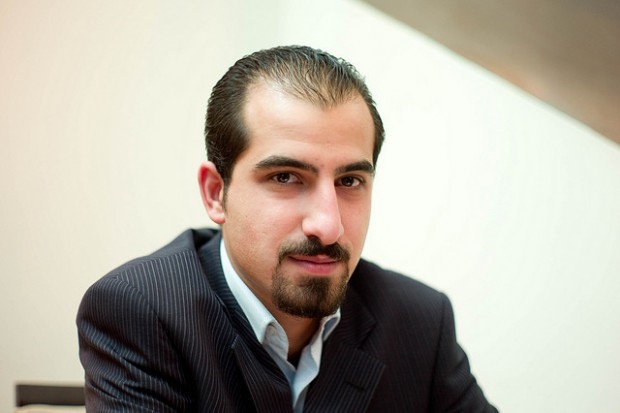
Four years have passed since Palestinian-Syrian software developer Bassel Khartabil (aka Bassel Safadi) was arrested in Damascus. Following the protests that swept the country in 2011, Syria descended into civil war, leading to a conflict which has now claimed over 250,000 lives. Khartabil was detained on 15 March 2012, the first anniversary of the Syrian uprising, as he left work in the al-Mezzeh district of the city.
The online activist was tortured for five days by the regime of Bashar al-Assad, and was then tried without having access to a lawyer by a military court on charges of “harming state security”. His trial lasted a matter of minutes.
Back in 2010, Khartabil started Syria’s first hackerspace, Aiki Lab, in Damascus. It was a base from which he helped advance the open source movement in Syria. Khartabil is also known for his work on free culture projects such as Creative Commons and Mozilla Firefox, and was an avid contributor and editor to Wikipedia. Prior to his arrest, he was working on software to enable the free flow of information in a country where online communications and networks were closely monitored by the government.
Because of his efforts using technology to promote an open and free internet — especially in Syria, where online censorship is rife and access to knowledge is scant — Khartabil won the 2013 Index on Censorship Digital Freedom Award. In 2012, Foreign Policy magazine named him as one of the top 100 global thinkers.
 Until 3 October 2015, he was being held at Adra Prison in Damascus by the Syrian government. Without prior warning, he was moved to an unknown location, although there is speculation he may have been transferred to the Military Field Court in Qaboun. On 12 November 2015, Khartabil’s wife, Noura Ghazi Safadi, reported rumours that her husband had been sentenced to death by the military courts, although the Assad regime has yet to confirm or deny the reports.
Until 3 October 2015, he was being held at Adra Prison in Damascus by the Syrian government. Without prior warning, he was moved to an unknown location, although there is speculation he may have been transferred to the Military Field Court in Qaboun. On 12 November 2015, Khartabil’s wife, Noura Ghazi Safadi, reported rumours that her husband had been sentenced to death by the military courts, although the Assad regime has yet to confirm or deny the reports.
“I’ve just gotten disturbing and shocking news that Bassel has been sentenced to death. I think this means that the transfer to military prison was very dangerous. I really don’t know other news. May God help him, we hope it’s not too late. We are worried sick about his life,” Ghazi Safadi wrote.
The United Nations Working Group on Arbitrary Detention has deemed Khartabil’s imprisonment as arbitrary and in violation of international law. He has already spent four years unlawfully behind bars with very little contact with the outside world. He was married in prison and has spent four birthdays there.
We encourage you to join Index on Censorship in renewed calls for Khartabil’s immediate release. On Saturday 19 March, a worldwide demonstration in support of Khartabil will take place, including a protest at Marble Arch in London.
In the run-up to the demonstration, Wikipedia founder Jimmy Wales advocated for Khartabil’s freedom. “The current case that I’m really, really campaigning for is the case of Bassel,” he said. “It’s a huge deal; go out and find out about it, but get involved in all of these cases.”
Khartabil’s absence has been felt not only by his family but by the communities he has worked so hard to foster. We must not forget the contributions this champion of free speech has made to digital freedoms.